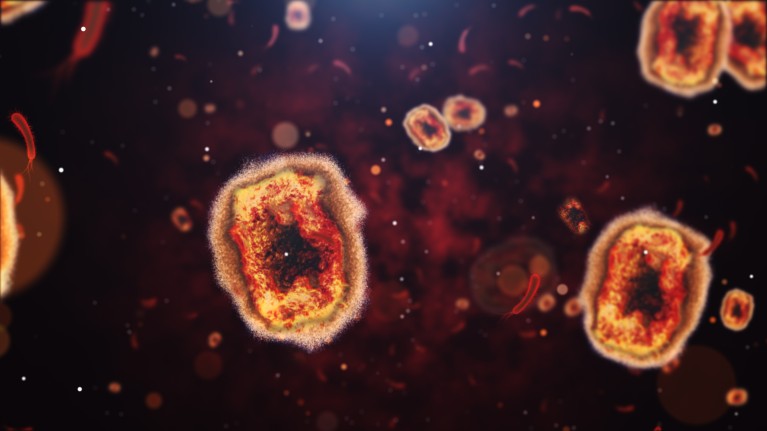
Monkeypox virusCredit: Kontekbrothers iStock/Getty Images Plus
Knowledge gaps in research may hinder global response to the current outbreak of monkeypox, a viral disease that is endemic in several African countries. The outbreak has been growing in other countries beyond Africa, sending warning signals around the world.
Since 1970, when the first human case of monkeypox was reported in the Democratic Republic of Congo, few cases have been reported outside Africa. Over the past few weeks, however, over 780 cases have been confirmed in 27 non-endemic countries, according to WHO’s official tally. Seven African countries have cumulatively reported a possible 1400 cases.
“What we are dealing with now is a very unusual situation that hasn’t been seen in previous years,” Sylvie Briand, director of the Pandemic and Epidemic Diseases Department at the World Health Organization (WHO) said at the 75th World Health Assembly in Geneva. Researchers are still unsure of the animal reservoir of the virus and what is driving the outbreaks. The current outbreak is a reminder for the need for more research to further understand the disease, with the WHO urging countries to raise disease surveillance levels and improve countermeasures.
In Nigeria, monkeypox’s re-emergence ended a 40-year hiatus. According to the country’s Center for Disease Control and Prevention (NCDC), between September 2017 and April 2022, a total of 558 cases and 8 deaths were confirmed from 22 Nigerian states. “Of these, 15 cases have been confirmed in 2022 alone - this does not constitute an outbreak.,” the center stated.
Ifedayo Adetifa, director general of the NCDC said “monkeypox has been a priority disease for surveillance given its prioritization by WHO and country member states, its epidemic potentials, and its relationship with smallpox.”
Different theories and knowledge gaps
It is still difficult to determine if the worst is over or the outbreak will worsen. The WHO is also unable to project the spread of the disease in countries where it is not endemic. “We don’t know if what we are seeing is just the very tip of the iceberg or have we already passed the spike in transmission communities,” Briand told the World Health Assembly.
The prevailing knowledge gap has led to the emergence of different hypotheses and theories regarding the disease. Adetifa noted low risk perception among the population, suggesting the disease could be mistaken for chickenpox by individuals. Matshidiso Moeti, WHO’s Africa regional director, observed that the few African countries reporting cases of monkeypox could suggest that some parts of Africa may well have built up some immunity to the disease. Initial genome sequencing data has reduced suspicion that the viral genome had mutated, although the WHO announced more sequencing would be required.
The WHO suggests that the decrease of COVID restrictions may have contributed to the spike in the number of cases. “People are taking advantage of the removal of COVID restrictions to go out more and attend events. There is more human contact or larger assemblies of people leading to a facilitated transmission of this disease,” Briand added. She, however, called for more research in order to identify the factors driving the outbreak and to identify the animal reservoir of the disease so that adequate prevention measures can be introduced.
The UK health security agency reported that a notable proportion of the cases identified to date have been among people who are gay, bisexual and men who have sex with men. But the WHO warned that this could be misleading especially if the group is the only ones that are being targeted for screening.
In a study published in PLOS, Eveline Bunge and colleagues suggest that the surge in the number of cases may be driven by countries winding down smallpox vaccinations, which provided some cross-protection against monkeypox. While the paper does not imply that the virus is mutating, it however suggested that it is increasingly becoming a disease of global health importance.
Oyewale Tomori, a Nigerian professor of virology, told Nature Africa that focusing on connecting the reported cases will provide some clarity and overcome the uncertainties researchers face presently. “I think there must be a link between each of those cases. If we study and do the work well, including contact tracing., and we also need to sit down and analyze the figures and closely study the severe cases before making decisions on next steps.”
